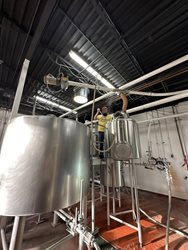FINAL GRAVITY BREWING: Tech Enhanced Process Serves Up the Perfect Pint
Final Gravity is proud to be a part of Michigan’s manufacturing industry. From the malt, hops, equipment, and even the soda we serve in our restaurant, we try to purchase from other Michigan companies as much as we can. Working with MMTC was a great experience and their commitment to making sure Michigan manufacturers succeed is critical to the future of our state.
-- Kevin Christenson, Co-Owner
Opened in July 2014, Final Gravity Brewing Company (www.finalgravitybrew.com) is a microbrewery located in Decatur, Mich. producing craft beer and wine. The company is owned and operated by father and son team, Kevin and Michael Christensen, who own and operate a restaurant of the same name. Final Gravity Brewing employs 6.
Challenge
Final Gravity Brewing is committed to serving exceptional quality and customer service. Originally a self-distribution brewery, Final Gravity was presented with an opportunity to expand their business through a third-party distributor. They knew it was an opportunity they wanted to take. With this new demand, Final Gravity needed to find a way to increase production efficiently.
Solution

To streamline their processes and fulfill new orders, Final Gravity reached out to Michigan Manufacturing Technology Center (MMTC) for guidance. MMTC conducted a Technology Opportunity Assessment. During this assessment, it was identified that Final Gravity would benefit most from transitioning their existing manual bottling process to an automatic process. Final Gravity possessed a single hand-operated bottling machine which required two employees to manually fill, place the cap and seal the beverage. At best, they were producing 11 cans a minute. With MMTC’s guidance and assistance from the Michigan Economic Development Corporation’s Industry 4.0 Technology Implementation Grant, Final Gravity purchased and installed a new automatic bottler which allowed them to increase production to 20 cans per minute.
This new equipment also allowed for increased product quality. The new canner now automatically rinses and purges the can of all oxygen before it is filled and finishes the cap with CO2, which increased shelf life. An additional machine was purchased for printing distribution date codes, which allowed for improved inventory management and quality control.
Results
- New Investment: $52,000 total
- Jobs Retained: 6
- Increased Production: 66% Increase in production per hour